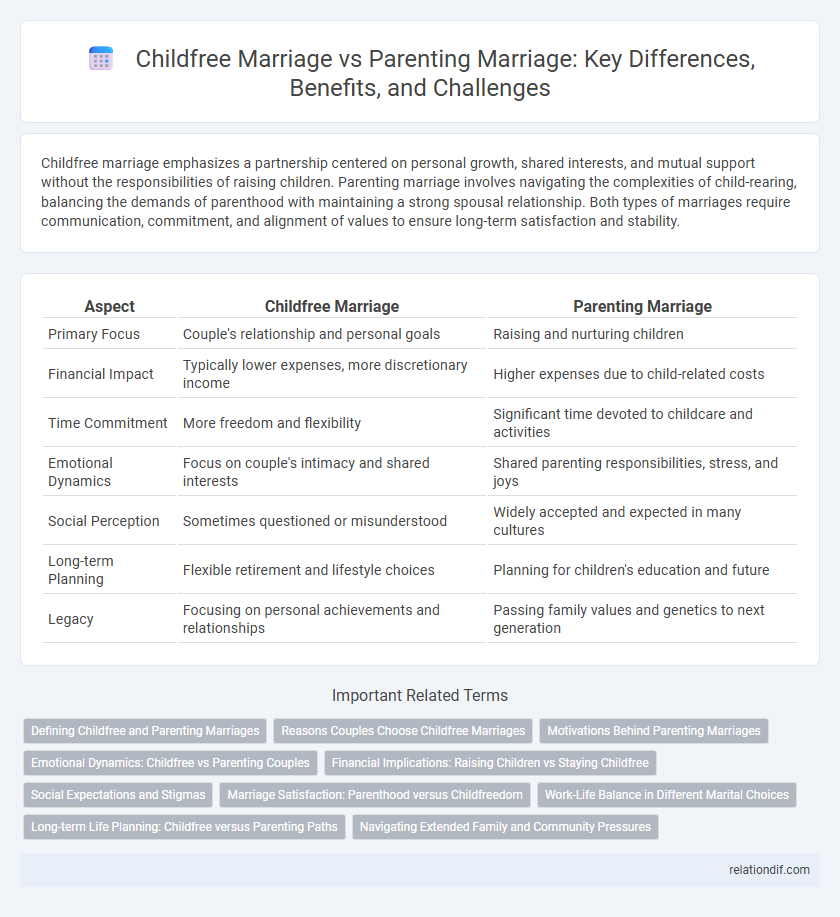Childfree marriage emphasizes a partnership centered on personal growth, shared interests, and mutual support without the responsibilities of raising children. Parenting marriage involves navigating the complexities of child-rearing, balancing the demands of parenthood with maintaining a strong spousal relationship. Both types of marriages require communication, commitment, and alignment of values to ensure long-term satisfaction and stability.
Table of Comparison
| Aspect | Childfree Marriage | Parenting Marriage |
|---|---|---|
| Primary Focus | Couple's relationship and personal goals | Raising and nurturing children |
| Financial Impact | Typically lower expenses, more discretionary income | Higher expenses due to child-related costs |
| Time Commitment | More freedom and flexibility | Significant time devoted to childcare and activities |
| Emotional Dynamics | Focus on couple's intimacy and shared interests | Shared parenting responsibilities, stress, and joys |
| Social Perception | Sometimes questioned or misunderstood | Widely accepted and expected in many cultures |
| Long-term Planning | Flexible retirement and lifestyle choices | Planning for children's education and future |
| Legacy | Focusing on personal achievements and relationships | Passing family values and genetics to next generation |
Defining Childfree and Parenting Marriages
Childfree marriage refers to a committed partnership where both individuals choose not to have children, prioritizing personal freedom, career goals, or lifestyle preferences over parenthood. Parenting marriage, on the other hand, centers around raising children as a primary shared objective, with responsibilities and decisions often revolving around the well-being and development of offspring. Defining these marriage types involves understanding the intentional intentions behind family planning and the resulting impact on relationship dynamics and life priorities.
Reasons Couples Choose Childfree Marriages
Couples choose childfree marriages for various reasons, including prioritizing personal freedom, career growth, and financial stability over parenthood. Many prefer to invest time and resources into their relationship, hobbies, and lifestyle choices without the responsibilities of raising children. Health concerns and environmental considerations also influence the decision to remain childfree, reflecting a conscious lifestyle choice rather than societal pressure.
Motivations Behind Parenting Marriages
Parenting marriages are primarily motivated by a desire to nurture and raise children, driven by biological, emotional, and cultural factors that emphasize family growth and legacy. Couples often value the shared responsibility and bonding experiences that come with child-rearing, viewing parenthood as a key component of marital fulfillment. Societal expectations and personal aspirations also play significant roles in shaping decisions toward entering parenting marriages.
Emotional Dynamics: Childfree vs Parenting Couples
Childfree marriages often experience emotional dynamics centered around autonomy, personal growth, and shared interests, fostering deep intimacy and mutual support without the added stress of child-rearing responsibilities. Parenting marriages navigate complex emotional landscapes involving caregiving demands, role negotiation, and shifting couple identities, which can strengthen bonds through collective challenges or create tension due to exhaustion and differing parenting styles. Emotional resilience and effective communication are critical in both types of marriages to maintain connection and satisfaction, regardless of the presence or absence of children.
Financial Implications: Raising Children vs Staying Childfree
Raising children significantly increases household expenses, including costs for childcare, education, healthcare, and extracurricular activities, often totaling hundreds of thousands of dollars per child before adulthood. Childfree couples generally experience greater financial flexibility, allowing for higher discretionary spending, increased savings, and earlier retirement potential. Long-term financial planning frequently favors childfree marriages due to reduced living expenses and fewer economic responsibilities tied to child-rearing.
Social Expectations and Stigmas
Childfree marriages often face social expectations and stigmas rooted in traditional views of family and procreation, where the absence of children is frequently misunderstood or judged as selfish or incomplete. Parenting marriages are generally socially accepted and praised, aligning with societal norms that equate marital success with raising children and continuing family lineage. The increasing visibility of childfree couples challenges these norms, promoting broader acceptance and reshaping societal definitions of fulfillment within marriage.
Marriage Satisfaction: Parenthood versus Childfreedom
Marriage satisfaction varies significantly between childfree couples and those who choose parenting, with research indicating that childfree marriages often report higher levels of personal freedom and relationship satisfaction. Parenting marriages experience unique stressors such as increased financial pressure and reduced couple time, which can sometimes lower relationship satisfaction despite the fulfillment children bring. Studies highlight that when couples align their expectations and values around parenthood or childfreedom, marital satisfaction tends to improve regardless of the chosen path.
Work-Life Balance in Different Marital Choices
Childfree marriages often provide greater flexibility for career advancement and personal time, allowing partners to prioritize work-life balance without the demands of childcare. Parenting marriages require careful scheduling and division of labor to manage professional responsibilities alongside family needs, often leading to increased time constraints and stress. Studies indicate that couples who communicate effectively about their roles and expectations tend to achieve better work-life integration regardless of their marital choice.
Long-term Life Planning: Childfree versus Parenting Paths
Marriage without children often allows for greater financial flexibility, career mobility, and personalized lifestyle choices, enabling long-term life planning centered on individual or couple goals. In contrast, parenting marriages require strategic allocation of resources towards child education, healthcare, and emotional development, influencing savings, housing, and retirement plans. Both paths demand distinct foresight in financial management, time investment, and legacy considerations reflective of their unique family structures.
Navigating Extended Family and Community Pressures
Childfree marriages often face unique challenges when addressing expectations from extended family and community members who prioritize traditional parenting roles. Couples may establish clear boundaries and communicate their values consistently to mitigate unsolicited advice and societal pressure. Parenting marriages encounter pressures to conform to cultural norms around child-rearing, requiring negotiation and resilience to balance family expectations with personal choices.
Childfree marriage vs Parenting marriage Infographic

 relationdif.com
relationdif.com